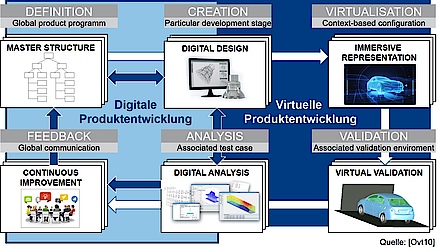MA - Digital tools for collaborative product development

Product developers use various methods to design products in line with requirements. Not only do basic and performance requirements have to be met, but excitement factors must also be created to set products apart from the competition. Products are increasingly becoming "smart", "intelligent" or "networked": they integrate features that are only created through the interaction of different disciplines, such as mechanical engineering, Electrical Engineering and IT. In the environment of model-based product development for intelligent technical systems, including interdisciplinary and agile development approaches, systems for digital and virtual product development are becoming indispensable. Their use often determines the effectiveness and efficiency of product creation. Digital tools facilitate the layout and design of products and production systems, virtual testing without the need to produce real prototypes and collaboration between different stakeholders across different locations and companies. In addition to development and collaboration tools, the transfer of real interactions into virtual, simulated space and a production and automation technology that extends to flexible, autonomous systems as part of digitalisation strategies are at the heart of the considerations.
Information on
| Module number | Rotation | Target group | Module name | Scope | Language |
| M.104.7308 | every winter semester (DVPE 1) / every summer semester (DVPE 2) | Master | Digital and virtual product creation | V2 / Ü1 | German |
Associated courses
Digital tools for collaborative product creation (DVPE 1)
Virtual and automated product creation (DVPE 2)
Contents
Digital tools for collaborative product development
- Computer Aided Design (CAD) and Engineering (CAE/CAx)
- Product Data Management (PDM)
- Product and Systems Lifecycle Management (PLM/SysLM)
- Interfaces to Enterprise Resource Planning (ERP) and Manufacturing Execution Systems (MES)
- Application-oriented basics of computer science
- Information systems, IT system architectures and interoperability (information management)
- Modelling, data management and methods of data analysis
- Human-machine interaction, visualisation and computer graphics
- Collaboration in product development
- Processes and tools
- Computer Supported Collaborative Work (CSCW)
- Use cases, in particular in relation to
- Model Based Systems Engineering (MBSE)
- Agile development
Goals
The DVPE module teaches both basic and application skills for future developers. Students are familiar with the fundamental principles and interrelationships of digital tools and virtual engineering and are able to explain them. They also explain how computer science concepts are implemented in application software. They apply the acquired knowledge and procedures with regard to selected software products and basic functions. This enables them to analyse their applicability for different situations and to solve specific problems successfully and quickly.

